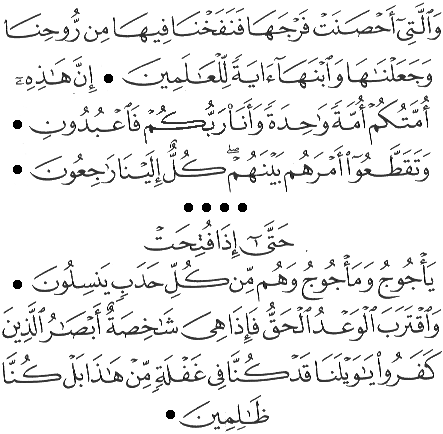Showing Islam is Peaceful • Tolerant • Rational • Inspiring
|
The second question to be resolved is whether the Holy Quran contains any reference to the Promised Messiah or not. Conclusive arguments show that such reference is indeed to be found in the Quran. There is no doubt that a person who considers the prophecies of the Holy Quran regarding the latter days of the followers of Islam, if he has a perceptive and living heart in his breast, will have no option but to accept that the Holy Quran certainly and definitely contains the news of a reformer who in other words could only be called the Promised Messiah and nothing else. To understand this prophecy, the following verses should be examined together. For instance:
(21:91-93, 96-97). {See author's footnote} The meaning is as follows. God guided the woman (Mary) who guarded her chastity. So He breathed into her His spirit, and made her and her son a sign for the world. And God said: This your community is a single community and I am your Lord, so serve Me. But they became divided into sects, shattered the unity, and raised mutual differences. Eventually they will all return to God. And they will remain in this condition till Gog and Magog {Note 1} are let loose and they sally forth from every vantage point. So when you see that Gog and Magog are dominant in the earth, know that the promise of the spread of the True Faith has drawn nigh, and that promise is: He it is Who sent His Messenger with guidance and the religion of truth, so that He may make it prevail over all other religions (The Quran 9:33 etc). It is then said that at the time of the fulfilment of this promise the eyes of the disbelievers will be fixedly open, and they will say: Woe to us, surely we were heedless of this, nay, we were unjust. That is, the Truth will be manifested most powerfully, and the disbelievers will realise that they were in error. The sum and substance of these verses is that, in the latter days, many religions will spread in the world, and there will be many sects. Then two nations will emerge, whose religion will be Christianity, and they will attain supremacy in every field. So when you see that the Christian faith and Christian governments have spread throughout the world, know that the time of the promise is near.
Footnote: Ezekiel, ch. 38 and ch. 39 verses 5-6. Raudat as-Sifa, Bayan Aqlim, iv, v and vi, and Tafsir Ma‘alam. {Go Back}
Translator's Note 1: Gog and Magog are two ancient tribes or nations mentioned both in the Bible and in the Holy Quran, and both books contain prophecies about their resurgence in the latter days. As this resurgence is linked to the coming of the Messiah, Hazrat Mirza explained that Gog and Magog in the prophecies represent the two dominant European races of modern times, i.e. the Eastern European Slavonic peoples and the Western European Teutonic peoples, because these ancient tribes were the racial forbears of these modern nations. The same prophecies speak of a Dajjal, for which see Note 3 in Chapter 2(a). Hazrat Mirza explained that, in the prophecies, the Western nations are called Gog and Magog in reference to their racial origin, and called Dajjal in reference to certain values of their civilisation. {Go to text} |
